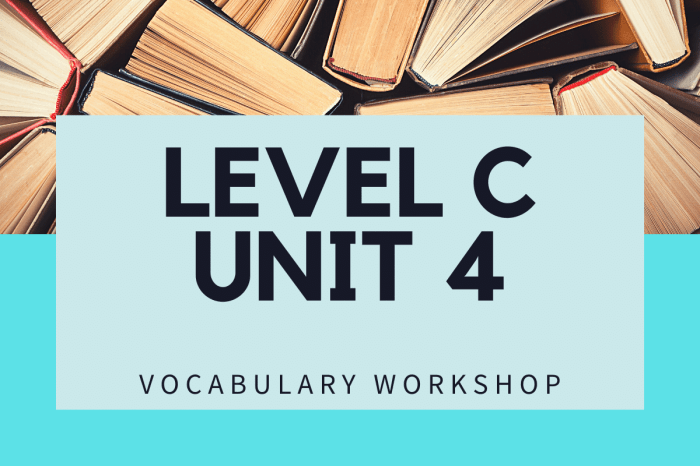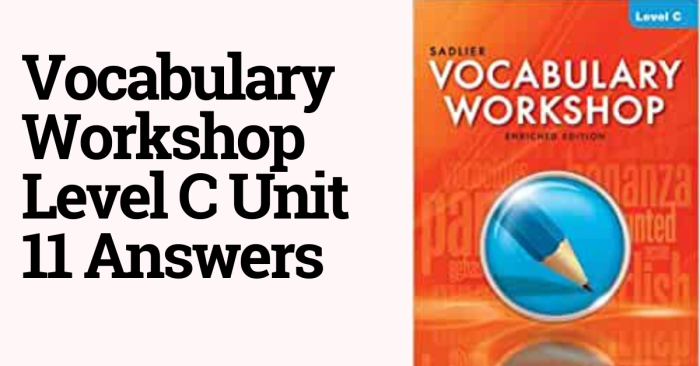Embark on a captivating journey through vocab workshop level c unit 8, where we’ll uncover effective strategies to expand your vocabulary, master word usage, and delve into the intricate relationships between words.
This comprehensive guide provides a wealth of practical techniques, engaging activities, and invaluable resources to empower you in your quest for vocabulary mastery.
Vocabulary Building Strategies

Expanding your vocabulary is crucial for effective communication and cognitive development. Here are some strategies to enhance your word power:
Active Reading
Engage actively with texts by highlighting unfamiliar words, looking them up in a dictionary, and recording their definitions. Repeat the words aloud and use them in sentences to reinforce retention.
Spaced Repetition
Review new words at increasing intervals (e.g., 10 minutes, 1 hour, 1 day, 1 week). This helps strengthen memories and improves long-term retention.
Word Games
Play word games like Scrabble, crossword puzzles, and vocabulary quizzes to expose yourself to a wider range of words. These activities provide a fun and engaging way to learn.
Contextual Learning
Immerse yourself in contexts where you encounter new words. Read widely, watch movies with subtitles, and engage in conversations with people who use a diverse vocabulary.
Incorporate New Words
Make a conscious effort to use new words in your daily speech and writing. The more you use them, the more comfortable and familiar they will become.
Word Usage and Context

Using words correctly in context is crucial for effective communication. Words can have multiple meanings, and their intended meaning is often determined by the surrounding context.
For example, the word “bank” can refer to a financial institution or the side of a river. The word “run” can mean to move quickly on foot or to operate a machine. By understanding the context in which a word is used, we can accurately interpret its intended meaning.
Context Clues
Context clues are hints within the text that help us determine the meaning of unfamiliar words. These clues can include:
- Definition or Explanation:The writer may provide a direct definition or explanation of the word.
- Synonyms and Antonyms:The writer may use synonyms (words with similar meanings) or antonyms (words with opposite meanings) to clarify the meaning of the unfamiliar word.
- Examples:The writer may provide examples of how the word is used in different contexts.
- Logical Relationships:The writer may use logical relationships (such as cause and effect, comparison, or contrast) to provide clues about the meaning of the unfamiliar word.
By paying attention to context clues, we can enhance our vocabulary and improve our understanding of written and spoken language.
Word Relationships: Vocab Workshop Level C Unit 8

Understanding the relationships between words is essential for expanding vocabulary and comprehending language effectively. Various types of word relationships exist, each with its unique characteristics and significance.
Synonyms, Vocab workshop level c unit 8
Synonyms are words that have similar or identical meanings. They can be used interchangeably in most contexts without altering the sentence’s meaning. For example, “happy” and “joyful” are synonyms.
Antonyms
Antonyms are words that have opposite meanings. They represent contrasting ideas or concepts. For instance, “hot” and “cold” are antonyms.
Homophones
Homophones are words that sound the same but have different spellings and meanings. They can be challenging to distinguish in speech but are easily differentiated in writing. An example of homophones is “bear” (animal) and “bare” (uncovered).
Homographs
Homographs are words that have the same spelling but different meanings or pronunciations. They can be either homophones or not. For example, “bow” (a weapon) and “bow” (to bend) are homographs.
Polysemy
Polysemy refers to words that have multiple related meanings. The meaning of a polysemous word depends on the context in which it is used. An example of a polysemous word is “run,” which can mean “to move quickly on foot,” “to operate,” or “to flow.”
Understanding Word Relationships
Understanding word relationships is crucial for several reasons. It enhances vocabulary by providing alternative words and expressions to convey ideas more precisely. It also improves comprehension by clarifying the meaning of unfamiliar words through their relationship to known words. Furthermore, understanding word relationships helps avoid ambiguity and ensures effective communication.
Vocabulary Activities
Engaging vocabulary-building activities are crucial for reinforcing new words and making the learning process enjoyable. These activities should cater to diverse learning styles and incorporate elements of fun and interactivity.
Games, puzzles, and exercises can be effective tools for vocabulary acquisition. By presenting new words in a playful and engaging context, these activities help learners retain information more effectively.
Types of Vocabulary Activities
- Word Games:Games like Scrabble, crossword puzzles, and word searches challenge learners to use their vocabulary skills in a competitive and entertaining way.
- Puzzles:Anagrams, cryptograms, and word jumbles require learners to manipulate and decipher words, improving their understanding of word structure and spelling.
- Exercises:Fill-in-the-blank exercises, matching exercises, and sentence completion tasks help learners practice using new words in context and reinforce their meaning.
When designing vocabulary activities, it’s important to consider the learning styles of the participants. Some learners may prefer visual aids, while others may benefit from auditory or kinesthetic activities. By incorporating a variety of activities, educators can cater to the needs of all learners and maximize their vocabulary acquisition.
Vocab Workshop Level C Unit 8 provides a comprehensive review of vocabulary related to the Renaissance. For a thorough understanding of this period, it’s highly recommended to supplement your studies with Abeka World History Test 12 , which offers detailed insights into the major events and figures of the Renaissance.
By combining these resources, you’ll gain a solid foundation in both vocabulary and historical context, ensuring your success in mastering this captivating era.
Vocabulary Assessment
Assessing vocabulary growth is crucial for tracking student progress and identifying areas for improvement. Various methods can be employed to evaluate students’ understanding of new words and their ability to use them effectively.
One approach is to develop quizzes or tests that measure students’ comprehension of specific vocabulary items. These assessments can include multiple-choice questions, fill-in-the-blanks, or short answer questions that require students to demonstrate their knowledge of word meanings, usage, and context.
Providing Feedback
Providing feedback on student progress is essential for guiding their learning and helping them identify areas where they need additional support. Feedback can be provided through written comments on quizzes or tests, individual conferences with students, or group discussions.
When providing feedback, it is important to be specific and constructive. Instead of simply saying “good job” or “needs improvement,” provide specific examples of what the student did well and areas where they can improve. This feedback should be timely and actionable, allowing students to make adjustments to their learning strategies.
Vocabulary Resources
Expanding your vocabulary is an ongoing journey, and there are numerous resources available to support your progress. Online tools, apps, and books can provide a wealth of information to help you master new words and improve your overall language skills.
Online Resources
- Dictionary.com:A comprehensive online dictionary that offers definitions, synonyms, antonyms, and usage examples.
- Thesaurus.com:A specialized resource for finding synonyms and antonyms, allowing you to expand your vocabulary and express yourself more precisely.
- Vocabulary.com:An interactive platform that provides personalized vocabulary lists, quizzes, and games to make learning fun and engaging.
- Google Ngram Viewer:A powerful tool for exploring word usage patterns over time, helping you understand how words have evolved in their meaning and usage.
Mobile Apps
- Anki:A flashcard app that uses spaced repetition to optimize memorization and retention.
- Memrise:A gamified vocabulary learning app that combines games, videos, and quizzes to make learning enjoyable.
- Quizlet:A versatile app that offers various learning modes, including flashcards, quizzes, and games, to cater to different learning styles.
Books
- Word Power Made Easy by Norman Lewis:A classic guide to vocabulary building that provides practical tips and exercises.
- Building Vocabulary for College Success by Douglas Fisher and Nancy Frey:A comprehensive resource for students preparing for college-level vocabulary.
- The Vocabulary Builder Workbook by Chris Lele:A workbook that provides exercises and activities to enhance vocabulary skills.
These resources are valuable tools that can supplement your vocabulary learning journey. By utilizing them regularly, you can significantly expand your vocabulary, improve your communication skills, and gain a deeper understanding of the language.
Clarifying Questions
What are the key strategies for expanding vocabulary?
Vocab workshop level c unit 8 emphasizes effective methods such as spaced repetition, active recall, and incorporating new words into daily usage.
How can I improve my word retention?
Techniques like flashcards, mind mapping, and engaging in discussions can significantly enhance word retention.
What are the different types of word relationships?
Vocab workshop level c unit 8 covers synonyms, antonyms, homophones, and more, exploring the nuances of word connections.